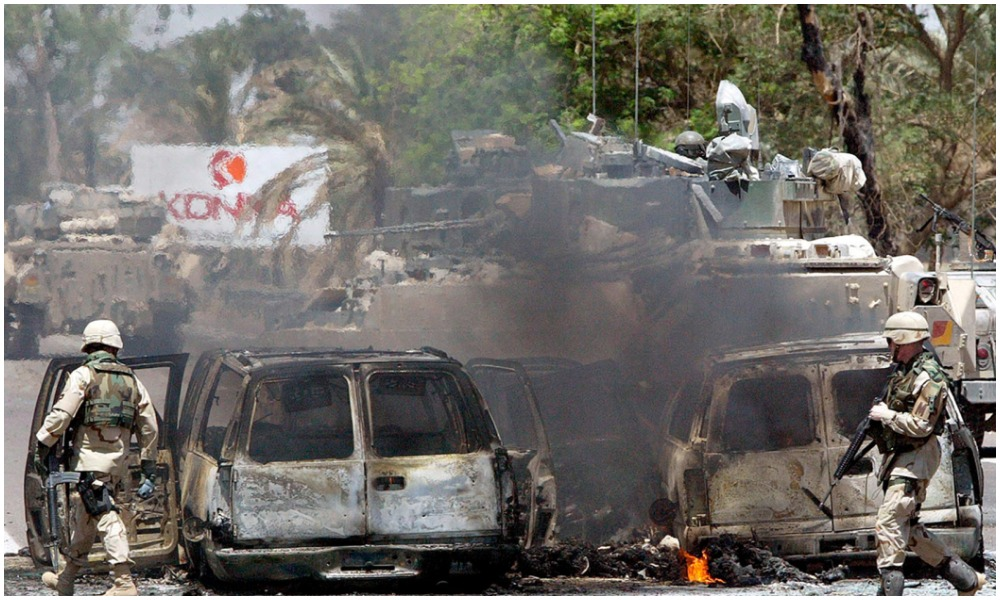UN slams Trump for pardoning Blackwater contractors

The United Nations said Wednesday night it was deeply concerned by US President Donald Trump’s move to pardon four former Blackwater security contractors convicted of killing 14 Iraqi civilians in 2007.
“We are deeply concerned by the recent US presidential pardons for four security guards from the private military firm Blackwater who were convicted for killing 14 Iraqi civilians.
The UN Human Rights Office spokesperson, Marta Hurtado, said in the statement that “pardoning them contributes to impunity.”
Hurtado said the four individuals were given sentences ranging from 12 years to life imprisonment, including on charges of first-degree murder.
“By investigating these crimes and completing legal proceedings, the US complied with its obligations under international law. Victims of gross human rights violations and serious violations of international humanitarian law also have the right to a remedy.
“This includes the right to see perpetrators serve punishments proportionate to the seriousness of their conduct,” Hurtado said.
The UN Human Rights Office (UNOCHA) in turn called on the US to renew its commitment to fighting impunity for gross human rights violations and serious violations of international humanitarian law and to uphold its obligations to ensure accountability for such crimes.
This comes after Trump’s announcement Wednesday that the four security contractors,
Nicholas Slatten, Paul Slough, Evan Liberty and Dustin Heard, were among a group of 15 prisoners to be pardoned.
A White House statement said Slatten, Slough, Liberty and Heard had a “long history of service to the nation” as veterans of the US Army and US Marine Corps, and that their pardons were “broadly supported by the public… and elected officials”.
It added that the Court of Appeals “ruled that additional evidence should have been presented at Mr Slatten’s trial”, and that prosecutors recently disclosed “that the lead Iraqi investigator, who prosecutors relied heavily on to verify that there were no insurgent victims and to collect evidence, may have had ties to insurgent groups himself”.
But according to the BBC, the father of a boy who died called the move “indescribable” and a rights group said Trump had hit a “new low”.
Slatten, Slough, Liberty and Heard were among 19 Blackwater private security contractors assigned to guard a convoy of four heavily-armored vehicles carrying US personnel on 16 September 2007.
According to the US justice department, at about noon that day several of the contractors opened fire in and around Nisoor Square, a busy roundabout that was immediately adjacent to the heavily-fortified Green Zone in Baghdad.
When they stopped shooting, at least 14 Iraqi civilians were dead – 10 men, two women and two boys, aged nine and 11. Iraqi authorities put the toll at 17.
US prosecutors said Slatten was the first to fire, without provocation, killing Ahmed Haithem Ahmed Al Rubiay, an aspiring doctor who was driving his mother to an appointment.
The contractors said they mistakenly believed that they were under attack.
The incident caused international outrage, strained relations between the US and Iraq, and sparked a debate over the role of contractors in warzones.
In 2014, a US federal court found Slatten guilty of murder, while Slough, Liberty and Heard were convicted of voluntary manslaughter, attempted manslaughter and other charges. Slatten was sentenced to life in prison, and the other three were handed 30-year terms.
Slough, Liberty and Heard subsequently had their sentences reduced to 15, 14 and 12 years respectively.
BBC reported that according to Hina Shamsi, director of the American Civil Liberties Union’s National Security Project, Trump had “hit a disgraceful new low with the Blackwater pardons”.
“These military contractors were convicted for their role in killing 17 Iraqi civilians and their actions caused devastation in Iraq, shame and horror in the United States, and a worldwide scandal. President Trump insults the memory of the Iraqi victims and further degrades his office with this action.”
Mohammed Kinani, whose nine-year-old son Ali was killed in Nisoor Square, told Middle East Eye: “No-one is above the law is what we learned in America, but now there’s someone above the law.”
“I don’t know how this is allowed. I don’t think that America is built on such principles,” he added.
